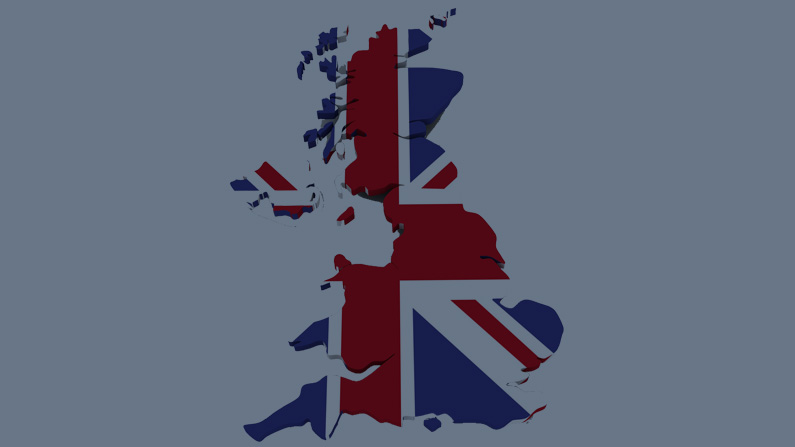UK election week round-up: 16th to 22nd April
Immigration is now the number one issue people say is affecting Britain, according to newly published IPSOS Mori data. Our analysis of mainstream and social media coverage says that the number one topic is Europe, although this week the two topics were closely linked with discussion of Europe’s response to the migrant crisis in the Mediterranean. Housing and Welfare were also lead topics in mainstream news and social media, the Conservatives Right-to-Buy policy featuring in Housing news and SNP manifesto launch referencing Welfare policies on Twitter. Party coverage by topic highlighted the prevalence of UKIP and Nigel Farage’s success at ‘getting noticed’.
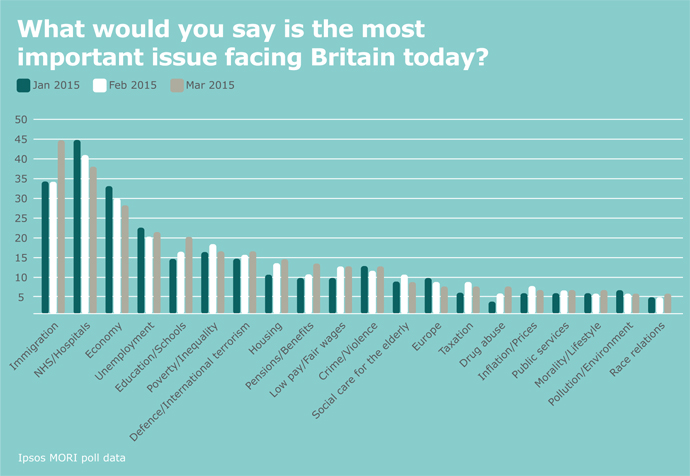
Ipsos MORI updated its monthly issues tracker this week so now we have data for March. It shows us that immigration experienced a nine percentage point increase this month, overtaking the NHS as the most important issue people say is facing Britain. The Economy remains in third place.
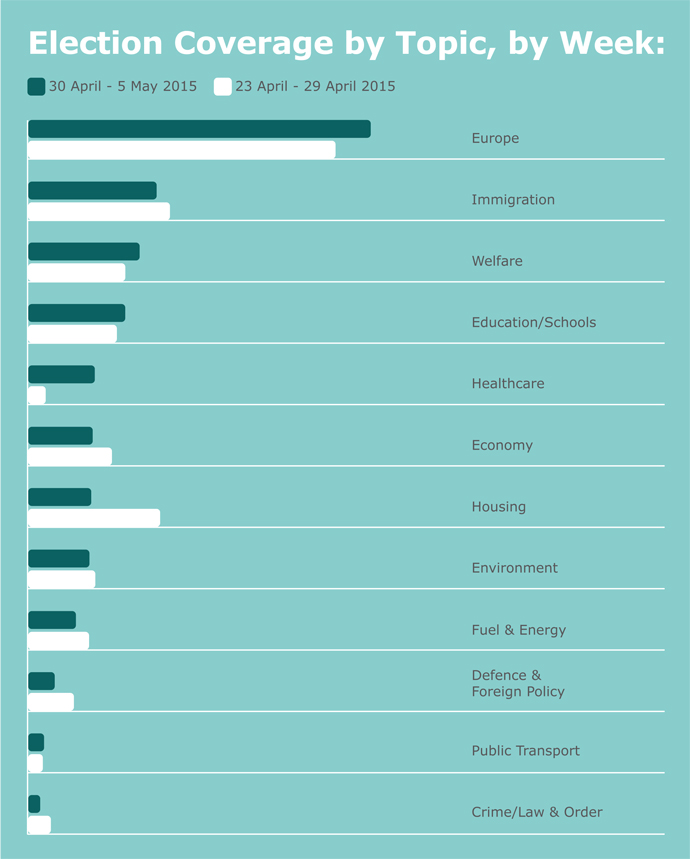
Immigration is also receiving an increasing amount of election coverage the nearer we get to the big day. The most discussed topic however, at least during the last week, was Europe, with Welfare and Housing not far behind. Other ‘rising’ topics were Environment, Public Transport and Crime / Law & Order. This week we’ll explore what is driving that Europe coverage and take a closer look at Immigration, Welfare and Housing.
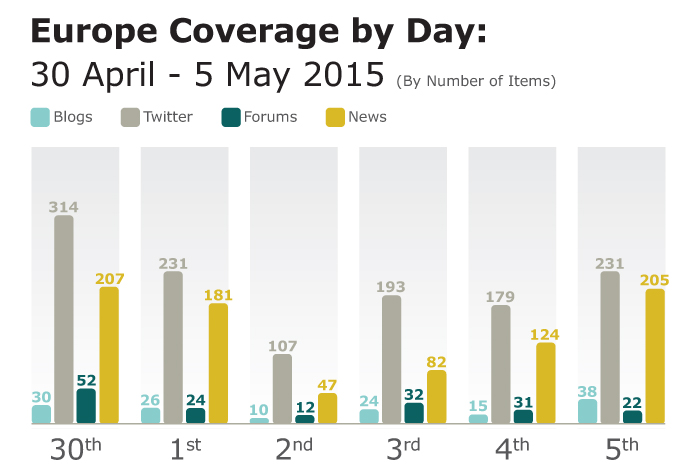
The biggest subtopic in coverage related to Europe, in both mainstream news and Twitter coverage, was debate about a possible EU referendum. One of the trigger articles, widely shared on Twitter, was a Daily Telegraph article which said that the majority of finance workers would vote for the UK to remain part of the European Union in any future referendum. Tweeters from (or with an interest in) Northern Ireland and Scotland also expressed views on a potential EU referendum, typical tweets included this one from a Labour supporter: ‘Biggest threat to UK isn’t SNP at Westminster but Tories holding an EU referendum, with England voting to leave and Scotland voting to stay’.
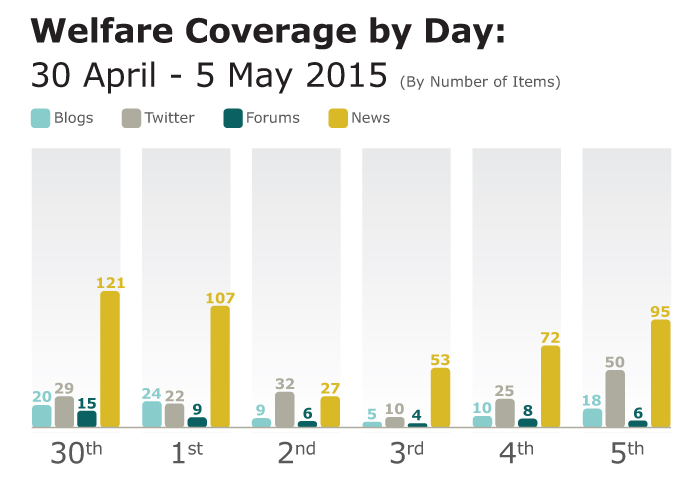
The 18th April was the busiest day for welfare on Twitter this week, although it was the day with the lowest volume of mainstream news. Two SNP related Tweets from the Sunday Herald received high volumes of retweets ahead of the SNP Manifesto launch and from SNP supporter @snapdragon6469 who tweeted “Let’s not forget, the lib dems helped the Tories destroy the welfare state & cause the foodbank explosion. Vote them out of Scotland too”.
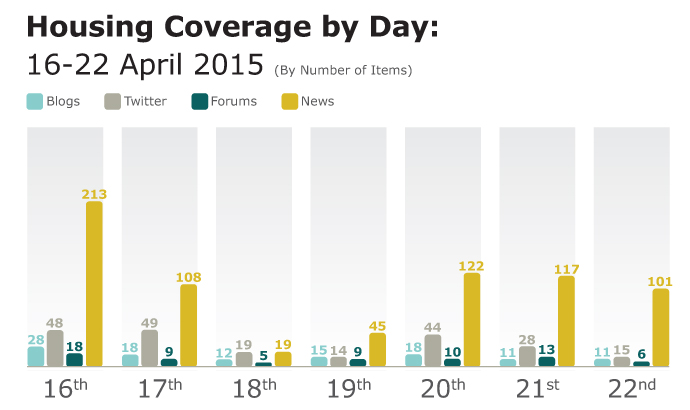
Housing coverage was high in mainstream news at the beginning of the week, contributed to by the Conservative’s controversial right-to-buy manifesto pledge. @BuildingNews ran a poll asking: “Is an extension of the #righttobuy a sensible reaction to the UK’s #housing crisis?” which gained traction on Twitter. The second leadership TV debate was also a key catalyst for discussion of housing, this Reuters led item outlining the “Housing policies of Britain’s major political parties” also received pick-up on Twitter.
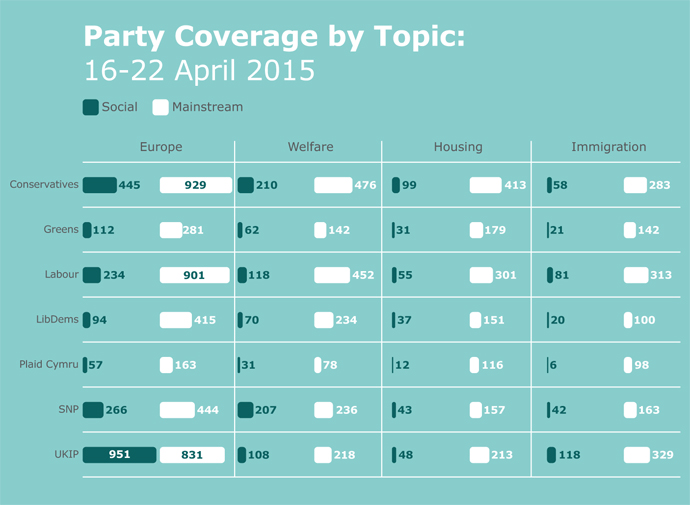
We’ve already seen that immigration is increasing in importance for the British electorate, we can also see that the volume of Europe is continuously high. Does this mean the two issues are being mentioned in the same context? It did this week, looking more closely at immigration associated coverage showed us that it was dominated by news about the plight of migrants crossing the Mediterranean, and discussion of Britain and Europe’s response to the crisis. So immigration was discussed not just as an election issue, but in the context of a real-time, unfolding event.
When drilling down into party coverage of the issue, it is no surprise that UKIP continues to be the party most linked to the topic. A great deal of this content is published by UKIP supporters on Twitter, i.e. “No matter who I speak to, people r seriously worried about immigration in UK & its impact. All voting UKIP”. The opposition view is similarly prevalent, also referencing UKIP, as seen from prolific tweeter @kcheersbye, “england was bland before immigrants came and spiced it up (literally the food here is awful), you’re welcome UKIP voters. you is welcome”, which received multiple retweets. UKIP’s keystone policy appears to be serving as a pole around which opposing views can rotate.
Labour is also receiving (or generating) high volumes of immigration related coverage, occupying an easy second place in the volume ranking. This Daily Mail article proclaiming “Vote Labour if you want millions of illegal immigrants gaining access to the UK as Miliband says let them in” was widely retweeted this week. Ed Miliband’s statement, on 17th April, that ‘All NHS Workers Must Speak English’ was also widely reported.
Beyond immigration, what does seem surprising is the volume of coverage UKIP is receiving generally. Nigel Farage admitted to the BBC this week that “the tone he has used on issues including immigration and HIV was designed to ‘get noticed’”. It seems it may have worked.
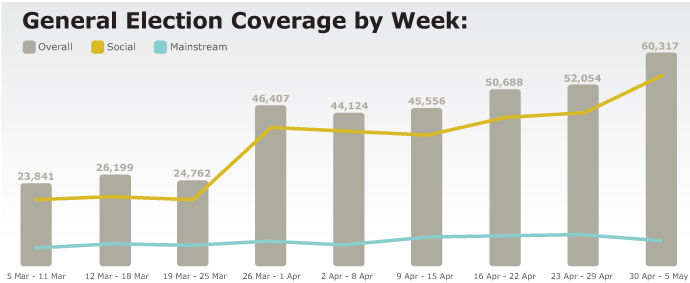
ABOUT THE ROUND-UP
The 2015 UK parliamentary election promises to be an interesting one, considered to be the first time we’ll see a seven party race, there is no stand-out winner predicted yet and chances of a coalition are high. It is also the first time that social media is likely to have a big impact. There are lots of election trackers watching the media coverage and response to this event, we particularly like Election Unspun by the Media Standards Trust, Ipsos Mori’s Issues Tracker and the BBC’s ‘Poll of polls’. Most of these focus on one specific channel and at Commetric we wondered what we might learn from looking at these findings together, comparing what’s been published in the edited press, with what people publish themselves on social media and what people say are the important issues when asked.
We used the Ipsos MORI issue groups to create searches using related keywords to interrogate mainstream and social media. We then charted the volumes of mainstream and social media coverage for each issue and created word clouds, which highlight the most frequently occurring words in a debate. Our team of analysts then examined this data to pull out the interesting findings. The searches used include key phrases used by the general public to ensure relevant data is returned – the welfare search for example included terms such as JSA, jobseeker’s allowance, DWP, Department for Work and Pensions and bedroom tax. All coverage also had to mention phrases associated with voting or the election as well as the UK, England, Scotland, Ireland or Wales.

